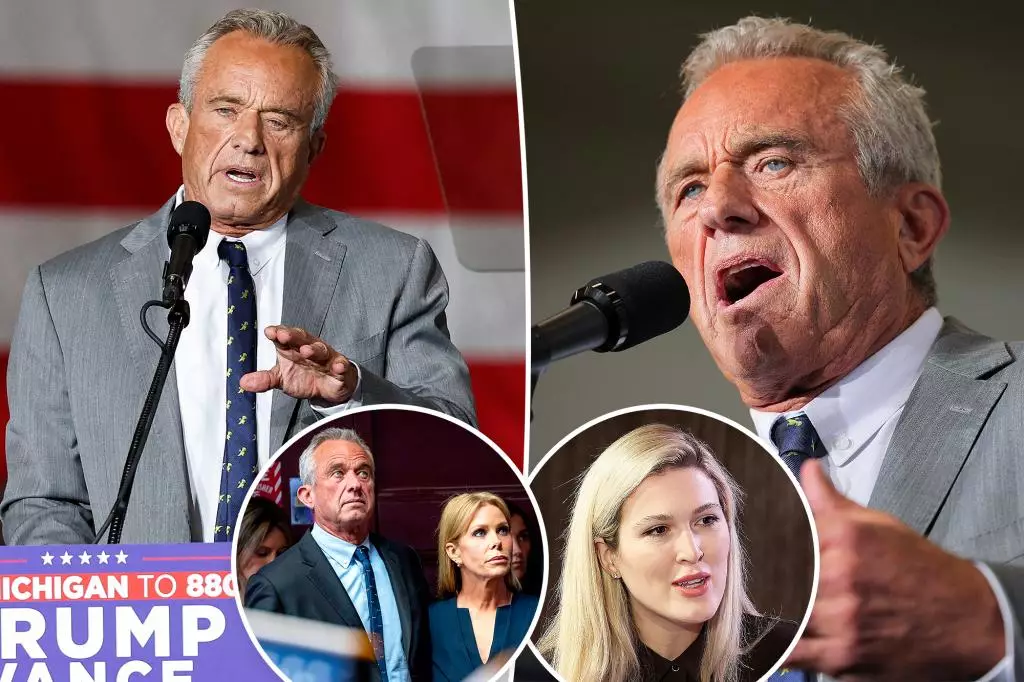In the whirlwind of political life, few figures embody the complexities of public persona as prominently as Robert F. Kennedy Jr. Recent events, particularly his involvement in a sexting scandal with New York Magazine writer Olivia Nuzzi, have brought his character and credibility into sharp focus. Yet, in the face of controversy, Kennedy has continued his outspoken campaign on health and nutrition, seemingly unshaken by the personal revelations that would topple many. The juxtaposition of his public appearances against the backdrop of scandal offers an illuminating lens through which to analyze the current state of political discourse and the personal stakes involved.
The Dichotomy of Public and Private Life
Kennedy’s appearance at a Senate roundtable discussion on nutrition, despite the swirling rumors of his personal life, underscores a critical aspect of modern American politics: the fusion of personal struggles with the public realm. During this event, noted figures like “The Biggest Loser” star Jillian Michaels and psychologist Dr. Jordan B. Peterson joined Kennedy in discussing pressing issues regarding American health. The conversation took a serious tone when addressing the topics of corporate influence and the commodification of health, spotlighting those in power using public platforms to challenge the established systems of food and health regulation.
One might argue that Kennedy’s ability to maintain a semblance of normalcy amid scandal speaks to a certain resilience, a hallmark of political characters who are often caricatured yet remain in high office. Observers noted he “seemed great,” suggesting an ability to compartmentalize issues in ways both admirable and concerning. It begs the question: does this separation enhance his credibility as a health advocate, or does it undermine his moral authority?
Kennedy’s efforts in advocating for robust health standards and his denunciation of the food and pharmaceutical industries reflect a broader movement toward accountability. His passionate critiques, such as the assertion that “you can’t trust what’s on the ingredient label” due to “government corruption,” tap into a vibrant vein of public skepticism surrounding regulatory institutions. These assertions resonate with many who feel disillusioned by governmental and corporate complicity.
However, such strong stances often draw critique. The sharp dichotomy between his public persona as a champion for American health and his private life that reveals questionable choices creates a complex narrative for his supporters and detractors alike. How can a figure promoting transparency and ethical standards navigate a personal scandal without losing the very credibility that fuels his public advocacy?
The media landscape plays a pivotal role in shaping public perception of Kennedy’s actions. The juxtaposition of scandal with substantial discussions on health reflects broader dynamics in American media: sensationalism often takes precedence over nuanced coverage. The questions posed to Kennedy during interviews — particularly regarding his “regrets” over his affair — highlight the pressures public figures face to respond to personal life controversies while simultaneously carrying the burden of their public duty.
In response to a pointed question from Fox News’ Martha MacCallum, Kennedy’s brusque dismissal of the scandal reveals much about his approach to media interactions. His focus on health and political issues instead of addressing personal allegations signals a strategy to redirect the narrative. Yet, this method may also foster skepticism among constituents who seek authenticity and integrity in their public figures.
As Kennedy navigates the aftermath of his scandal, the implications for his career and public image loom large. His position in the political echelon is precarious; endorsements and support from influential figures could significantly sway his future endeavors. Should Kennedy pursue further political positions, perhaps even a cabinet role should Donald Trump succeed in his election bid, the challenge will be to reconcile his public personas amid lingering questions about his personal life.
Ultimately, the contradictions within Robert F. Kennedy Jr. present a microcosm of broader themes in American politics: the interplay between personal integrity and public advocacy, the formidable resilience of public figures despite scandal, and the media’s role in crafting public perception. In a climate where moral scrutiny is commonplace, Kennedy’s journey serves as a point of contemplation for both allies and adversaries alike, echoing the ongoing complexities of navigating public life in the modern age.

